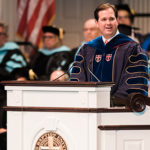JACKSONVILLE, Fla—Jerry Rankin, who has served 17 years as president of the Southern Baptist Convention’s International Mission Board, has announced plans to retire next summer. Rankin, who will be 68 when he retires July 31, 2010, told the mission board’s trustees at their Sept. 15-16 meeting in Jacksonville, Fla.
Jimmy Pritchard, pastor of First Baptist Church in Forney, will chair the search committee to seek Rankin’s successor. The Forney church is dually aligned with the Baptist General Convention of Texas and the Southern Baptists of Texas Convention.
Nathan Lino, pastor of Northeast Houston Baptist Church in Humble, which is uniquely aligned with the Southern Baptists of Texas Convention, also will serve on the search committee. Norman Coe, associate pastor of Highview Baptist Church in Louisville, Ky, will be vice chair.
Others on the search committee are Stuart Bell, pastor of First Baptist Church in Centerton, Ark.; Joe Hewgley of Pleasant Hill Baptist Church in Rogers, Ark.; Jana Brown from Peavine Baptist Church in Fort Oglethorpe, Ga.; Charles Allen Fowler from West Jackson Baptist Church in Jackson, Tenn.; Robert Jackson, pastor of Peninsula Baptist Church in Troutman, N.C.; Mike Penry from First Baptist Church in Garner, N.C., Tim Locher from First Baptist Church in Hendersonville, N.C.; Dick Landry from Trinity Baptist Church in Lake Charles, La.; Kathy Towns from First Baptist Church in Arcadia, La.; Ray Jones, pastor of Ridgecrest Baptist Church in Dothan, Ala.; Richard Powell, pastor of McGregor Baptist Church in Fort Myers, Fla; and Paul Chitwood, pastor of First Baptist Church in Mount Washington, Ky.
Increased reliance on local churches to carry out the mission task is one of the most significant accomplishments of his tenure, Rankin told reporters in a conference call the day after he announced his retirement plans.
He has encouraged the IMB to make “an intentional effort not to do mission on behalf of Southern Baptists but seeking to multiply the resources and the people by mobilizing our churches, by personalizing their involvement, and getting churches, associations and state conventions to truly partner with us in the task of global missions,” he said.
Currently, as many as 8,000 Southern Baptist churches are engaged in direct, long-term mission partnerships overseas, Rankin said —a dramatic strategic shift in a denomination that traditionally relied exclusively on a large force of full-time missionaries to carry out that task.
The strategic shift has had the practical effect of enabling Southern Baptists to maintain mission involvement in the midst of an economic crisis, Rankin said.
Earlier this year, revenue shortfalls led IMB trustees to place a cap on the number of missionaries they could appoint and forced them to consider a long-term restriction if contributions remained low. Currently the IMB employs about 5,600 missionaries.
Sign up for our weekly edition and get all our headlines in your inbox on Thursdays
“Already the role of the missionary has significantly changed,” he said.
“Their role now is engagement in discipleship and leadership training. They’re not the primary church planter doing the work. It’s what they do in partnership with national believers and churches and conventions. That’s going to be even more part of the strategy in the future.”
That approach could be enhanced as a result of an intensive self-examination undertaken by the SBC, said Rankin. Last June the SBC appointed a Great Commis-sion task force to study its organizational and funding mechanisms.
Rankin expressed little enthusiasm for one proposal being given wide currency—that the mission priority could be accomplished more effectively through a merger of the IMB and the North American Mission Board, whose top executive recently resigned.
“Certainly in terms of our denominational structure and the way things are done, I personally would not see this as advisable or desirable,” he said.
“Most people do not comprehend how radically different the two boards are. The only thing we have in common are the words ‘mission’ and ‘board’ in our names. Our focus, our structure, our nature—there’s no similarity whatever. To try to merge two entities with such a different focus would create an even greater bureaucracy that would dilute any effectiveness we have with the IMB and NAMB in their unique assignments.”
Any merger that simply combined all responsibilities currently assigned to both the IMB and NAMB would be cumbersome, said Rankin.
In the meantime, Rankin said he hopes a new president of the IMB will have vision, focus and passion.
“We’ve got to have a leader who is a visionary, who can see the future, what can be, what is beyond the current reality, where we need to go to complete the Great Commis-sion and reach all people with the gospel,” he said.
“But we also need a leader who has the discipline to stay focused and keep the organization focused. There is a natural tendency to become too broad and lose focus on the goal. And the leader has to have a heart and a passion for the task. There can’t be a pretense in this. Passion communicates to and influences others that you are seeking to lead.”
Rankin said the president will benefit from a board of trustees that “has never been more unified.”
His disagreements with trustees—which culminated in policy and personnel changes that some observers saw as direct slaps at Rankin—have tempered, he said.
“I have never felt more unity and support,” he said. “That’s a good time to relinquish the role, when you’re riding the wave.”















We seek to connect God’s story and God’s people around the world. To learn more about God’s story, click here.
Send comments and feedback to Eric Black, our editor. For comments to be published, please specify “letter to the editor.” Maximum length for publication is 300 words.